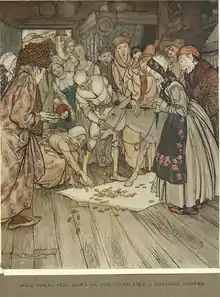The Wishing-Table, the Gold-Ass, and the Cudgel in the Sack
"The Wishing-Table, the Gold-Ass, and the Cudgel in the Sack" is a fairytale by the Brothers Grimm. The original German name is Tischlein deck dich, Goldesel und Knüppel aus dem Sack.
Plot
A tailor had three sons who were all fed by the milk of their goat. The oldest son was given the task to let the animal graze at the finest grass fields. At the end of the day the son asked the goat whether it had eaten enough and the animal confirmed this. However, when they returned home the goat claimed the opposite, causing the tailor to get upset and drive his son out of the house. This pattern repeats itself with the second oldest and youngest son too, who are also falsely blamed by the goat for not feeding it enough and as a result are kicked out of the house as well. Only when the father goes out to feed the goat himself and discovers that the creature still claims it hasn't eaten enough does he realize he misjudged his sons. He takes his razor, shaves the goat bare and uses his whip to drive it out of his house. The tailor is left alone in his house longing for his sons' return.
The story then follows each son individually. The first one went to a maker of furniture and learned the craft. After his service his master gave him a magic table as a sign of gratitude. Whenever he says "Table, Deck Yourself" the table decks itself with the finest food and wine. The son decides to travel home and show his father what he learned and earned. On his way he visits a local inn, where he demonstrates the powers of the magic table. At night the inn keeper steals the table and switches it for a normal table, without the son being aware. When the son arrives home and tries to show the powers of the table to his father nothing happens, which upsets his father once again.

The second son goes to work for a miller. His master gives him a magical donkey who is able to produce gold out of its mouth and behind at the command of "Bricklebrit!" Just like the oldest son, the second son decides to travel home and happens to visit the same inn his brother did. He too demonstrates the powers of the donkey to the innkeeper who once again steals the animal at night and replaces it with a normal donkey, without the son being aware of what happened. When the son arrives home and tries to show the powers of the donkey instead of gold pieces landing on the cloth, it is droppings like an ordinary donkey, which upsets his father once again.
The third son went to work for a woodturner and is given a magic cudgel in a bag. Whenever someone is injust the owner of the cudgel just needs to say: "Cudgel, out the sack!" and the object will start clobbering the wrongdoer. Only when the owner says: "Cudgel in the sack!" will the thing return in the bag. Just like his brothers, the son visits the same inn, because he learned from their letters on what had happened. Instead of demonstrating the powers of his possession he deliberately remains vague about it, making the inn keeper curious enough to go out at night and try to look what's in the bag. Anticipating this, the son orders the cudgel to beat the inn keeper up until he returns everything he has stolen. When the son returns home with the table, donkey and cudgel he tells his father what had happened and demonstrates the powers of the objects. His father finally makes peace with his sons and they all live a rich life ever after.
As an epilogue, the story also informs the reader what happened to the goat. The shaven animal went to hide inside a fox hole. When the fox returned home it was scared away by the goat's eyes. The fox asks a bear for help, but he is also too frightened to go in. Finally they take a bee along with them, who stings the goat, causing the animal to run away in pain. The storyteller concludes that nobody knows where she is now.
Variants
Czech author Václav Tille (writing under pseudonym Václav Říha) published a similar tale, titled Ubrousku, prostři se: the protagonist receives a lamb that produces money, a handkerchief that materializes food and a magical cane.[1]
In popular culture
The table (since 1999), donkey (since 1956) and cudgel (since 1963) are exhibited in the Dutch theme park De Efteling.[2]
A Hungarian variant of the tale was adapted into an episode of the Hungarian television series Magyar népmesék ("Hungarian Folk Tales") (hu), with the title A szegény csizmadia és a szélkirály ("The Poor Cobbler and the King of Winds"). In this version, the poor man visits the King of the Winds and obtains a lamb that produces money on command, a magic tablecloth and a beating cane.
Sources
- Říha, Václav. Zvířátka a petrovští. 7. vyd. Praha: Albatros, 1977. pp. 63–67.
- http://www.efteling.com/NL/Over-de-Efteling/Sprookjes-bestaan/Efteldingen-Sprookjes/Lees-hier-alle-Sprookjes/Tafeltje-Dek-je.html
External links
 Works related to The Wishing-Table, the Gold-Ass, and the Cudgel in the Sack at Wikisource
Works related to The Wishing-Table, the Gold-Ass, and the Cudgel in the Sack at Wikisource Media related to The Wishing-Table, the Gold-Ass, and the Cudgel in the Sack at Wikimedia Commons
Media related to The Wishing-Table, the Gold-Ass, and the Cudgel in the Sack at Wikimedia Commons- A szegény csizmadia és a szélkirály at IMDb